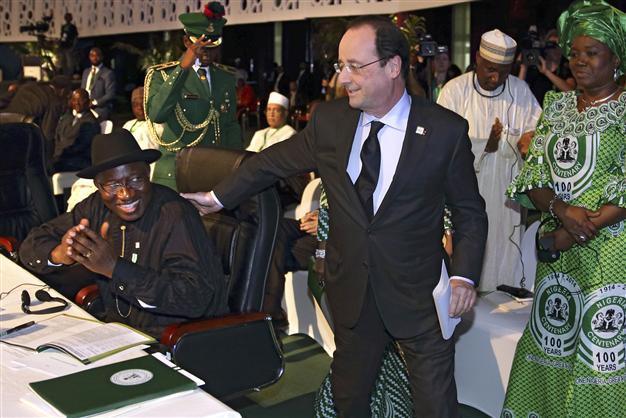Hollande seeks Central Africa unity as France digs in
BANGUI, Central African Republic - Agence France-Presse

French President Francois Hollande, center, walks past Nigerian President Goodluck Jonathan to deliver a speech during the International Conference on Peace and Security in Abuja, Nigeria, as part of its Centenary celebrations, Thursday, Feb. 27, 2014. AP Photo
French President Francois Hollande urged unity in the Central African Republic on Feb. 28, nearly three months into a tough military mission to stop religious bloodshed.His high-security visit to Bangui caps a week that saw the French parliament extend Operation Sangaris and another 400 extra troops arrive in the deeply unstable former French colony, taking their number to 2,000.
Hollande went straight to the airport base of Operation Sangaris for a briefing with his Defence Minister Jean-Yves Le Drian and the commander of the French mission, General Francisco Soriano, journalists at the scene said.
One aim of the intervention is "to avoid at any price the partition of the country", Hollande said while he reviewed French troops, adding that "thousands of lives have been saved thanks to you."
"The stakes of this visit are to assess what has been accomplished in three months and to decide on the next missions," the French leader said.
Faced with relentless bloodshed in which armed extremist Christian militias have slaughtered Muslim civilians in revenge for atrocities by a mainly Muslim rebel alliance that seized power for 10 months last year, France has been forced to change its objectives.
"Francois Hollande thought that the mission of the Sangaris troops would be over in a few months. A mistake," the Bangui daily Le Quotidien declared on Feb. 28.
Hollande was set to meet interim President Catherine Samba Panza, who has urged France and the 6,000 troops deployed by the African Union to make full use of their UN mandate to "wipe out these unchecked elements that poison our lives."
France sought to help "reestablish the authority of the state, renew dialogue" and prevent partition, Hollande said.
Paris has acknowledged that its troops face considerable difficulties in halting the conflict, but Soriano stressed Feb. 27 that the Central African people needed to start doing their share.
"Central Africans need to participate in the reconstruction of their own country. We already do a lot," the general told AFP.
Second visit
Hollande visited the landlocked, largely lawless nation for the first time in early December, days after French troops poured into the country to cheers from villagers.
Today, there is mounting hostility towards the French as the violence has escalated, sparking warnings by top aid officials that ethnic cleansing was under way, including in remote parts of the country.
"No need to come, Mr Hollande, we're already dead," said one Muslim woman in a Bangui street.
Nearly a quarter of the 4.6-million population has been displaced since the start of the conflict. Some 400,000 residents of the capital - half its population - have fled their homes for makeshift camps.
Relief organisations have warned that the flight of Muslims - who controlled a large share of trade and farming - risked exacerbating a major food crisis in what was already one of the world's poorest countries before the conflict.
Rebels from the mainly Muslim Seleka group seized power last March but some carried out a campaign of killings, mutilations and looting, provoking the response of mostly Christian vigilante forces, known as "anti-balaka" (anti-machete) groups.
Michel Djotodia, the Seleka leader who became the country's first Muslim leader, was forced to quit in January but the "anti-balaka" defence groups have escaped the control of the authorities and continue to commit atrocities.
On Feb. 27, a convoy of around 50 armoured vehicles and lorries entered the country from Chad, carrying the 400 additional French troops to reinforce those already deployed.
The European Union has also pledged between 800 to 1,000 troops but negotiations on which countries will provide them are still going on.
Despite concerns that France could get bogged down in a war offering little prospect of a clear-cut success, parliament approved the extension of Operation Sangaris earlier this week.
But Paris is urging the United Nations to expedite plans to take over the lead role in peacekeeping efforts, as it has done in the strife-torn Democratic Republic of Congo.
















